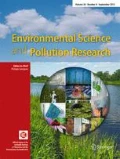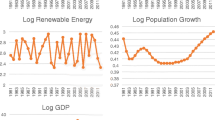Abstract
Both developed and underdeveloped economies worldwide are now more concerned than ever in respect of achieving environmental sustainability. Accordingly, the majority of the global economies have ratified several environment-related pacts to facilitate the tackling of global environment-related problems. Although these problems are assumed to be addressed using diverse mechanisms, limiting the use of fossil fuels has often been recognized as the ultimate enabler of environmental sustainability. Against this backdrop, this study aims to assess the environmental impacts associated with higher renewable energy use, controlling for economic growth and population size, in the context of the G7 and E7 countries using data from 1997 to 2018. Moreover, instead of using the traditional environmental quality proxies, this study tries to proxy environmental degradation with the load capacity factor levels of the countries of concern. The long-run associations among the study’s variables are confirmed by outcomes generated from the cointegration analysis. Besides, regression analysis highlighted that integrating renewable energy into the energy systems while withdrawing from the use of fossil fuels can help to improve environmental quality by increasing the load capacity factor levels. In contrast, economic growth and population size expansion are evidenced to impose environmental quality-dampening impacts by reducing the load capacity factor levels. However, the findings, in the majority of the cases, are seen to differ across the groups of the G7 and E7 countries, especially in terms of the variations in the magnitudes of marginal environmental effects over the short and long run. Lastly, the causality analysis confirms the directions of the causal relationships among the variables of concern. Based on these results, a couple of policy interventions are recommended for improving environmental quality in the G7 and E7 countries.
Similar content being viewed by others
Availability of data and materials
The sources of data have been duly mentioned in the study.
Change history
05 July 2023
A Correction to this paper has been published: https://doi.org/10.1007/s11356-023-28562-1
Notes
“The G7 countries include Germany, Italy, Canada, France, Japan, the USA, and the UK. The E7 countries include Brazil, India, China, Indonesia, Mexico, Russia, and Turkey.”
“For ensuring brevity, the correlation matrices and variance inflation factor outputs are not reported. The related tables can be made available following a reasonable request to the corresponding author.”
References
Abbass K, Qasim MZ, Song HM, Murshed M, Mahmood H (2022) A review of the global climate change impacts, adaptation, and sustainable mitigation measures. Environ Sci Pollut Res 29(28):42539–42559. https://doi.org/10.1007/s11356-022-19718-6
Afshan S, Ozturk I, Yaqoob T (2022) Facilitating renewable energy transition, ecological innovations and stringent environmental policies to improve ecological sustainability: evidence from MM-QR method. Renewable Energy 196:151–160
Agozie DQ, Gyamfi BA, Bekun FV, Ozturk I, Taha A (2022) Environmental Kuznets curve hypothesis from lens of economic complexity index for BRICS: evidence from second generation panel analysis. Sustainable Energy Technol Assess 53:102597
Ahmed Z, Adebayo TS, Udemba EN, Murshed M, Kirikkaleli D (2022a) Effects of economic complexity, economic growth, and renewable energy technology budgets on ecological footprint: the role of democratic accountability. Environ Sci Pollut Res 29(17):24925–24940
Ahmed Z, Ahmad M, Rjoub H, Kalugina OA, Hussain N (2022b) Economic growth, renewable energy consumption, and ecological footprint: exploring the role of environmental regulations and democracy in sustainable development. Sustain Dev 30(4):595–605
Ahmed Z, Murshed M, Ahmad M, Shah MI, Mahmood H, Abbas S (2022c) How do green energy technology investments, technological innovation, and trade globalization enhance green energy supply and stimulate environmental sustainability in the G7 countries? Gondwana Res 112:105–115. https://doi.org/10.1016/j.gr.2022.09.014
Ahmed Z, Cary M, Ali S, Murshed M, Ullah H, Mahmood H (2021a) Moving toward a green revolution in Japan: symmetric and asymmetric relationships among clean energy technology development investments, economic growth, and CO2 emissions. Energy Environ 0958305X211041780.
Ali S, Can M, Shah MI, Jiang J, Ahmed Z, Murshed M (2022) Exploring the linkage between export diversification and ecological footprint: evidence from advanced time series estimation techniques. Environ Sci Pollut Res 29(25):38395–38409
Alola AA, Bekun FV, Sarkodie SA (2019) Dynamic impact of trade policy, economic growth, fertility rate, renewable and non-renewable energy consumption on ecological footprint in Europe. Sci Total Environ 685:702–709
Alvarado R, Tillaguango B, Murshed M, Ochoa-Moreno S, Rehman A, Işık C, Alvarado-Espejo J (2022) Impact of the informal economy on the ecological footprint: the role of urban concentration and globalization. Econ Anal Policy 75:750–767
Amin A, Altinoz B, Dogan E (2020) Analyzing the determinants of carbon emissions from transportation in European countries: the role of renewable energy and urbanization. Clean Technol Environ Policy 22(8):1725–1734
Anwar A, Sinha A, Sharif A, Siddique M, Irshad S, Anwar W, Malik S (2022) The nexus between urbanization, renewable energy consumption, financial development, and CO2 emissions: evidence from selected Asian countries. Environ Dev Sustain 24(5):6556–6576
Awosusi AA, Kutlay K, Altuntaş M, Khodjiev B, Agyekum EB, Shouran M, ..., Kamel S (2022) A roadmap toward achieving sustainable environment: evaluating the impact of technological innovation and globalization on load capacity factor. Int J Environ Res Public Health 19(6):3288
Aydoğan B, Vardar G (2020) Evaluating the role of renewable energy, economic growth and agriculture on CO2 emission in E7 countries. Int J Sustain Energ 39(4):335–348
Baloch MA, Ozturk I, Bekun FV, Khan D (2021) Modeling the dynamic linkage between financial development, energy innovation, and environmental quality: does globalization matter? Bus Strateg Environ 30(1):176–184
Balsalobre-Lorente D, Driha OM, Leitão NC, Murshed M (2021) The carbon dioxide neutralizing effect of energy innovation on international tourism in EU-5 countries under the prism of the EKC hypothesis. Journal of Environmental Management 298(C):113513. https://doi.org/10.1016/j.jenvman.2021.113513
Bashir MF, Ma B, Bashir MA, Radulescu M, Shahzad U (2022) Investigating the role of environmental taxes and regulations for renewable energy consumption: evidence from developed economies. Economic Research-Ekonomska Istraživanja 35(1):1262–1284
Bouyghrissi S, Murshed M, Jindal A, Berjaoui A, Mahmood H, Khanniba M (2022) The importance of facilitating renewable energy transition for abating CO2 emissions in Morocco. Environ Sci Pollut Res 29(14):20752–20767
Chien F, Hsu CC, Ozturk I, Sharif A, Sadiq M (2022) The role of renewable energy and urbanization towards greenhouse gas emission in top Asian countries: evidence from advance panel estimations. Renew Energy 186:207–216
Chu LK, Le NTM (2022) Environmental quality and the role of economic policy uncertainty, economic complexity, renewable energy, and energy intensity: the case of G7 countries. Environ Sci Pollut Res 29(2):2866–2882
Chudik A, Mohaddes K, Pesaran MH, Raissi M (2016) Long-run effects in large heterogeneous panel data models with cross-sectionally correlated errors. In Essays in honor of Aman Ullah. Emerald Group Publishing Limited. https://doi.org/10.1108/S0731-905320160000036013
Destek MA, Aslan A (2020) Disaggregated renewable energy consumption and environmental pollution nexus in G-7 countries. Renewable Energy 151:1298–1306
Doğan B, Chu LK, Ghosh S, Truong HHD, Balsalobre-Lorente D (2022) How environmental taxes and carbon emissions are related in the G7 economies? Renewable Energy 187:645–656
Dogan E, Ozturk I (2017) The influence of renewable and non-renewable energy consumption and real income on CO2 emissions in the USA: evidence from structural break tests. Environ Sci Pollut Res 24(11):10846–10854
Dong F, Li Y, Gao Y, Zhu J, Qin C, Zhang X (2022) Energy transition and carbon neutrality: exploring the non-linear impact of renewable energy development on carbon emission efficiency in developed countries. Resour Conserv Recycl 177:106002
Du L, Jiang H, Adebayo TS, Awosusi AA, Razzaq A (2022) Asymmetric effects of high-tech industry and renewable energy on consumption-based carbon emissions in MINT countries. Renewable Energy 196:1269–1280
Dumitrescu EI, Hurlin C (2012) Testing for Granger non-causality in heterogeneous panels. Econ Model 29(4):1450–1460
Fareed Z, Salem S, Adebayo TS, Pata UK, Shahzad F (2021) Role of export diversification and renewable energy on the load capacity factor in Indonesia: a Fourier quantile causality approach. Front Environ Sci 434
GFN. (2022). Global Footprint Network. Available at https://www.footprintnetwork.org/ (Accessed on 15.10.2022)
Gyamfi BA, Adedoyin FF, Bein MA, Bekun FV (2021) Environmental implications of N-shaped environmental Kuznets curve for E7 countries. Environ Sci Pollut Res 28(25):33072–33082
Hamid I, Alam MS, Kanwal A, Jena PK, Murshed M, Alam R (2021) Decarbonization pathways: the roles of foreign direct investments, governance, democracy, economic growth, and renewable energy transition. Environ Sci Pollut Res. https://doi.org/10.1007/s11356-022-18935-3
Hao LN, Umar M, Khan Z, Ali W (2021) Green growth and low carbon emission in G7 countries: how critical the network of environmental taxes, renewable energy and human capital is? Sci Total Environ 752:141853
Huang Y, Haseeb M, Usman M, Ozturk I (2022) Dynamic association between ICT, renewable energy, economic complexity and ecological footprint: is there any difference between E-7 (developing) and G-7 (developed) countries? Technol Soc 68:101853
Ibrahim RL (2022) Post-COP26: can energy consumption, resource dependence, and trade openness promote carbon neutrality? Homogeneous and heterogeneous analyses for G20 countries. Environ Sci Pollut Res. https://doi.org/10.1007/s11356-022-21855-x
IEA (2021a) World energy balances: overview, IEA, Paris https://www.iea.org/reports/world-energy-balances-overview
IEA (2021b) Global energy review 2021b, IEA, Paris https://www.iea.org/reports/global-energy-review-2021b
Jahanger A, Usman M, Murshed M, Mahmood H, Balsalobre-Lorente D (2022) The linkages between natural resources, human capital, globalization, economic growth, financial development, and ecological footprint: the moderating role of technological innovations. Resour Policy 76:102569
Jin C, Razzaq A, Saleem F, Sinha A (2022) Asymmetric effects of eco-innovation and human capital development in realizing environmental sustainability in China: evidence from quantile ARDL framework. Economic Research-Ekonomska Istraživanja 35(1):4947–4970
Khan I, Hou F, Le HP (2021) The impact of natural resources, energy consumption, and population growth on environmental quality: fresh evidence from the United States of America. Sci Total Environ 754:142222
Khan S, Murshed M, Ozturk I, Khudoykulov K (2022) The roles of energy efficiency improvement, renewable electricity production, and financial inclusion in stimulating environmental sustainability in the Next Eleven countries. Renew Energy 193:1164–1176. https://doi.org/10.1016/j.renene.2022.05.065
Kurramovich KK, Abro AA, Vaseer AI, Khan SU, Ali SR, Murshed M (2022) Roadmap for carbon-neutrality: the mediating role of clean energy development-related investments. Environ Sci Pollut Res 29(23):34055–34074. https://doi.org/10.1007/s11356-021-17985-3
Le HP, Ozturk I (2020) The impacts of globalization, financial development, government expenditures, and institutional quality on CO2 emissions in the presence of environmental Kuznets curve. Environ Sci Pollut Res 27(18):22680–22697
Li L, Li G, Ozturk I, Ullah S (2022) Green innovation and environmental sustainability: do clean energy investment and education matter?. Energy Environ 0958305X221115096
Mehmood U, Agyekum EB, Uhunamure SE, Shale K, Mariam A (2022) Evaluating the influences of natural resources and ageing people on CO2 emissions in G-11 nations: application of CS-ARDL approach. Int J Environ Res Public Health 19(3):1449
Molefe T, Inglesi-Lotz R (2022) Examining the water–energy–food (WEF) nexus through an SDG lens for the big 5 African countries. Environ Dev Sustain. https://doi.org/10.1007/s10668-022-02650-7
Murshed M (2021) Can regional trade integration facilitate renewable energy transition to ensure energy sustainability in South Asia? Energy Rep 7(C):808–821. https://doi.org/10.1016/j.egyr.2021a.01.038
Murshed M (2021b) LPG consumption and environmental Kuznets curve hypothesis in South Asia: a time-series ARDL analysis with multiple structural breaks. Environ Sci Pollut Res 28(7):8337–8372
Murshed M, Dao NTT (2022) Revisiting the CO2 emission-induced EKC hypothesis in South Asia: the role of export quality improvement. GeoJournal 87(2):535–563. https://doi.org/10.1007/s10708-020-10270-9
Murshed M, Abbass K, Rashid S (2021a) Modelling renewable energy adoption across south Asian economies: empirical evidence from Bangladesh, India, Pakistan and Sri Lanka. Int J Financ Econ 26(4):5425–5450
Murshed M, Ahmed R, Kumpamool C, Bassim M, Elheddad M (2021b) The effects of regional trade integration and renewable energy transition on environmental quality: evidence from South Asian neighbors. Bus Strateg Environ 30(8):4154–4170
Murshed M, Saboori B, Madaleno M, Wang H, Doğan B (2022) Exploring the nexuses between nuclear energy, renewable energy, and carbon dioxide emissions: the role of economic complexity in the G7 countries. Renewable Energy 190:664–674
Nathaniel S, Nwodo O, Sharma G, Shah M (2020) Renewable energy, urbanization, and ecological footprint linkage in CIVETS. Environ Sci Pollut Res 27(16):19616–19629
Nathaniel SP, Alam M, Murshed M, Mahmood H, Ahmad P (2021) The roles of nuclear energy, renewable energy, and economic growth in the abatement of carbon dioxide emissions in the G7 countries. Environ Sci Pollut Res 28(35):47957–47972
Ozturk I, Al-Mulali U, Solarin SA (2019) The control of corruption and energy efficiency relationship: an empirical note. Environ Sci Pollut Res 26(17):17277–17283
Pata UK (2021) Do renewable energy and health expenditures improve load capacity factor in the USA and Japan? A new approach to environmental issues. Eur J Health Econ 22(9):1427–1439
Pata UK, Balsalobre-Lorente D (2022) Exploring the impact of tourism and energy consumption on the load capacity factor in Turkey: a novel dynamic ARDL approach. Environ Sci Pollut Res 29(9):13491–13503
Pata UK, Isik C (2021) Determinants of the load capacity factor in China: a novel dynamic ARDL approach for ecological footprint accounting. Resour Policy 74:102313
Pata UK, Samour A (2022) Do renewable and nuclear energy enhance environmental quality in France? A new EKC approach with the load capacity factor. Prog Nucl Energy 149:104249
Pesaran MH (2007) A simple panel unit root test in the presence of cross-section dependence. J Appl Economet 22(2):265–312
Pesaran MH (2021) General diagnostic tests for cross-sectional dependence in panels. Empirical Economics 60(1):13–50
Pesaran MH, Yamagata T (2008) Testing slope homogeneity in large panels. Journal of Econometrics 142(1):50–93
Ponce P, Khan SAR (2021) A causal link between renewable energy, energy efficiency, property rights, and CO2 emissions in developed countries: a road map for environmental sustainability. Environ Sci Pollut Res 28(28):37804–37817
Qin L, Kirikkaleli D, Hou Y, Miao X, Tufail M (2021) Carbon neutrality target for G7 economies: examining the role of environmental policy, green innovation and composite risk index. J Environ Manage 295:113119
Rahman MM, Vu XB (2020) The nexus between renewable energy, economic growth, trade, urbanisation and environmental quality: a comparative study for Australia and Canada. Renewable Energy 155:617–627
Rauf A, Liu X, Amin W, Ozturk I, Rehman OU, Hafeez M (2018) Testing EKC hypothesis with energy and sustainable development challenges: a fresh evidence from belt and road initiative economies. Environ Sci Pollut Res 25(32):32066–32080
Raza SA, Shah N (2018) Testing environmental Kuznets curve hypothesis in G7 countries: the role of renewable energy consumption and trade. Environ Sci Pollut Res 25(27):26965–26977
Razmjoo A, Kaigutha LG, Rad MV, Marzband M, Davarpanah A, Denai M (2021) A technical analysis investigating energy sustainability utilizing reliable renewable energy sources to reduce CO2 emissions in a high potential area. Renewable Energy 164:46–57
Rehman A, Ma H, Ozturk I, Murshed M, Dagar V (2021) The dynamic impacts of CO2 emissions from different sources on Pakistan’s economic progress: a roadmap to sustainable development. Environ Dev Sustain 23(12):17857–17880
Rehman A, Alam MM, Ozturk I, Alvarado R, Murshed M, Işık C, Ma H (2022) Globalization and renewable energy use: how are they contributing to upsurge the CO2 emissions? A global perspective. Environ Sci Pollut Res. https://doi.org/10.1007/s11356-022-22775-6
Sahoo M, Sethi N (2021) The intermittent effects of renewable energy on ecological footprint: evidence from developing countries. Environ Sci Pollut Res 28(40):56401–56417
Salahuddin M, Alam K, Ozturk I (2016) The effects of Internet usage and economic growth on CO2 emissions in OECD countries: a panel investigation. Renew Sustain Energy Rev 62:1226–1235
Shang Y, Razzaq A, Chupradit S, An NB, Abdul-Samad Z (2022) The role of renewable energy consumption and health expenditures in improving load capacity factor in ASEAN countries: exploring new paradigm using advance panel models. Renewable Energy 191:715–722
Sharif A, Raza SA, Ozturk I, Afshan S (2019) The dynamic relationship of renewable and nonrenewable energy consumption with carbon emission: a global study with the application of heterogeneous panel estimations. Renewable Energy 133:685–691
Sharma R, Sinha A, Kautish P (2021) Does renewable energy consumption reduce ecological footprint? Evidence from eight developing countries of Asia. J Clean Prod 285:124867
Shen Y, Li X, Hasnaoui A (2021) BRICS carbon neutrality target: measuring the impact of electricity production from renewable energy sources and globalization. J Environ Manage 298:113460
Usman O, Akadiri SS, Adeshola I (2020) Role of renewable energy and globalization on ecological footprint in the USA: implications for environmental sustainability. Environ Sci Pollut Res 27(24):30681–30693
Usman A, Ozturk I, Naqvi SMMA, Ullah S, Javed MI (2022a) Revealing the nexus between nuclear energy and ecological footprint in STIRPAT model of advanced economies: fresh evidence from novel CS-ARDL model. Prog Nucl Energy 148:104220
Usman O, Alola AA, Saint Akadiri S (2022b) Effects of domestic material consumption, renewable energy, and financial development on environmental sustainability in the EU-28: evidence from a GMM panel-VAR. Renewable Energy 184:239–251
Vo DH, Vo AT, Ho CM, Nguyen HM (2020) The role of renewable energy, alternative and nuclear energy in mitigating carbon emissions in the CPTPP countries. Renewable Energy 161:278–292
Westerlund J (2007) Testing for error correction in panel data. Oxford Bull Econ Stat 69(6):709–748
World Bank (2022) World development indicators. Available at https://databank.worldbank.org/source/world-development-indicators. Accessed on 16.10.2022
Xu D, Sheraz M, Hassan A, Sinha A, Ullah S (2022) Financial development, renewable energy and CO2 emission in G7 countries: new evidence from non-linear and asymmetric analysis. Energy Economics 109:105994
Xue L, Haseeb M, Mahmood H, Alkhateeb TTY, Murshed M (2021) Renewable energy use and ecological footprints mitigation: evidence from selected South Asian economies. Sustainability 13(4):1613
Xue C, Shahbaz M, Ahmed Z, Ahmad M, Sinha A (2022) Clean energy consumption, economic growth, and environmental sustainability: what is the role of economic policy uncertainty? Renewable Energy 184:899–907
Yasin I, Naseem S, Anwar MA, Madni GR, Mahmood H, Murshed M (2022) An analysis of the environmental impacts of ethnic diversity, financial development, economic growth, urbanization, and energy consumption: fresh evidence from less-developed countries. Environ Sci Pollut Res. https://doi.org/10.1007/s11356-022-21295-7
Yu Z, Khan SAR, Ponce P, de Sousa Jabbour ABL, Jabbour CJC (2022) Factors affecting carbon emissions in emerging economies in the context of a green recovery: implications for sustainable development goals. Technol Forecast Soc Chang 176:121417
Yunzhao L (2022) Modelling the role of eco innovation, renewable energy, and environmental taxes in carbon emissions reduction in E−7 economies: evidence from advance panel estimations. Renewable Energy 190:309–318
Yuping L, Ramzan M, Xincheng L, Murshed M, Awosusi AA, Bah SI, Adebayo TS (2021) Determinants of carbon emissions in Argentina: the roles of renewable energy consumption and globalization. Energy Rep 7:4747–4760
Yurtkuran S (2021) The effect of agriculture, renewable energy production, and globalization on CO2 emissions in Turkey: a bootstrap ARDL approach. Renewable Energy 171:1236–1245
Zeraibi A, Balsalobre-Lorente D, Murshed M (2021) The influences of renewable electricity generation, technological innovation, financial development, and economic growth on ecological footprints in ASEAN-5 countries. Environ Sci Pollut Res 28(37):51003–51021
Zhao J, Sinha A, Inuwa N, Wang Y, Murshed M, Abbasi KR (2022) Does structural transformation in economy impact inequality in renewable energy productivity? Implications for sustainable development. Renewable Energy 189:853–864
Zhu C, Chang Y, Li X, Shan M (2022) Factors influencing embodied carbon emissions of China’s building sector: an analysis based on extended STIRPAT modeling. Energy and Buildings 255:111607
Author information
Authors and Affiliations
Contributions
UK and AMK wrote the original draft, conducted the econometric analysis, analyzed the findings, reviewed, and edited the final draft. MSK and PA conceptualized, compiled the literature review, and generated the graphical illustrations. AH and RAP wrote the original draft, compiled the literature review, and contributed in the methodology section.
Corresponding author
Ethics declarations
Ethics approval
Not applicable.
Consent to participate
Not applicable.
Consent for publication
Not applicable.
Competing interests
The authors declare no competing interests.
Additional information
Responsible Editor: Roula Inglesi-Lotz
Publisher's note
Springer Nature remains neutral with regard to jurisdictional claims in published maps and institutional affiliations.
Rights and permissions
Springer Nature or its licensor (e.g. a society or other partner) holds exclusive rights to this article under a publishing agreement with the author(s) or other rightsholder(s); author self-archiving of the accepted manuscript version of this article is solely governed by the terms of such publishing agreement and applicable law.
About this article
Cite this article
Khan, U., Khan, A.M., Khan, M.S. et al. Are the impacts of renewable energy use on load capacity factors homogeneous for developed and developing nations? Evidence from the G7 and E7 nations. Environ Sci Pollut Res 30, 24629–24640 (2023). https://doi.org/10.1007/s11356-022-24002-8
Received:
Accepted:
Published:
Issue Date:
DOI: https://doi.org/10.1007/s11356-022-24002-8




